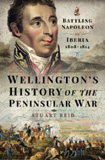|
Wellington’s History of
The Peninsular War
Battling Napoleon in Iberia 1808- 1814
by Stuart Reid
|
 Wellington’s campaign in Spain and Portugal has an enduring fascination. So much of the Peninsular War echoes through British history: ‘The Forlorn Hope’ at the siege of Badajoz; General Crauford’s heroic winter retreat across the high mountain passes to Corunna; the battles of Talavera, Ciudad Rodrigo and Vitoria; and the burial of Sir John Moore immortalised in the words of Wolfe’s poem, ‘We carved not a line and laid not a stone, but we left him alone with his glory’. Wellington’s campaign in Spain and Portugal has an enduring fascination. So much of the Peninsular War echoes through British history: ‘The Forlorn Hope’ at the siege of Badajoz; General Crauford’s heroic winter retreat across the high mountain passes to Corunna; the battles of Talavera, Ciudad Rodrigo and Vitoria; and the burial of Sir John Moore immortalised in the words of Wolfe’s poem, ‘We carved not a line and laid not a stone, but we left him alone with his glory’.
Wellington may have first made his name at the Battle of Assaye in India in 1803 with Waterloo the culmination of his military career, but it was his generalship in the Peninsular war that fired the public imagination and confirmed his status as our greatest general since Marlborough. Wellington felt his published dispatches to Horse Guards were sufficient record and never engaged in grandstanding memoirs. He did, however, write four lengthy memoranda about the Peninsular war. There’s a freshness to these memoranda as he wrote them as the war enfolded. The reader doesn’t have to suffer the prejudice of hindsight.
What strikes the reader in these memoranda is Wellington’s sheer mastery of his profession. Not only did he prove himself a master of the battlefield, but he allowed himself plenty of time to think at a political, diplomatic and strategic level. As he wrote, ‘The object in occupying this position is to defend Portugal, to divert attention of the French from the south of Spain and reinforcements. The filling of the rivers and the destruction of roads will, with a very few troops, be a sufficient defence in the winter for the south of Spain’.
Wellington writes a great deal in his memoranda about feeding 30,000 men and their horses as well as supplying a sufficient amount of ammunition and hospital stores. As he wrote, ‘I was determined to march towards Lisbon by road nearest to the sea in order that I might communicate with Captain Bligh ... who attended the movements of the army with a fleet of victuallers and store ships’. It’s fascinating stuff.
If you visit Apsley House in Hyde Park, it was the Duke’s London residence with the glorious address of No 1 London, you will see a painting by William Salter, ‘The Waterloo Banquet 1836’. Eighty-three of Wellington’s officers with whom he had served are present. It’s not a particularly good painting but it tells you a great deal about Wellington and how he educated his officers in the profession of arms. The memoranda from the Peninsular War are striking for the detail in which Wellington gives praise to the officers who performed well, ‘The conduct of Major General Colville was beyond all praise....The conduct of the 5th Regiment under Major Ridge affords a memorable example of what steadfastness and discipline of the troops and their confidence in their officers can effect’. Loyalty and judicious praise were hallmarks of his generalship.
Inevitably, unless you’re a real military aficionado, the memoranda of operations begin to tire because they are factual and lack the human and compelling narrative that you’ll find in, for example, Antony Beevor’s Stalingrad. But that’s not the point of this remarkable account brought together in a single connected narrative by the author and renowned historian Stuart Reid. He deserves great credit. One minor gripe: he comes from a family with a long military tradition and, like Antony Beevor and Max Hastings, can’t resist a swipe at the Household Division, ‘The Footguards, considering themselves superior to the rest of creation promoted their officers above those of ordinary regiments, a captain in the Footguards ranked as lieutenant colonel in the army’.
The Appendix, ‘British Officers’ mentioned in Wellington’s Dispatches’ is enjoyable. It outlines the biographies for nearly all the officers mentioned in the memoranda of operations. And what a life most of them led as the growing British Empire provided lucrative employment and no shortage of drama and excitement. Quite a few met sticky ends; others led blameless lives rising to the rank of full general without seeing a day in action. Most of us know that Sir Thomas Picton was killed in action at Waterloo but few that he fathered four children by his black mistress, Rosetta, while serving as Governor of Trinidad.
Wellington famously remarked that ‘The history of a battle, is not unlike the history of a ball, no individual can recollect the order of events or the moment they occurred’. This engaging and well-structured book by Stuart Reid does a fine job in providing a compelling perspective on one of the British Army’s great campaigns through the eyes of an extraordinary man.
Paul de Zulueta
Frontline Books. www.frontline-books.com
|
|